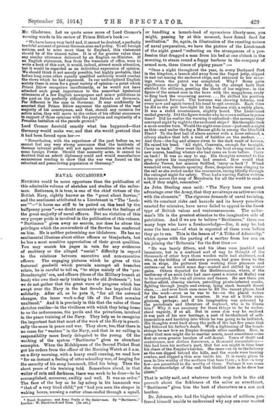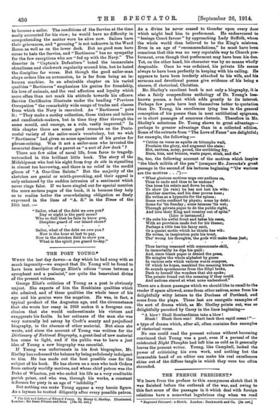NAVAL OCCASIONS.• NOTHING could be more opportune than the publication
of this admirable volume of sketches and studies of the sailor- man. Reticence, it is true, is one of the chief virtues of the British Navy, rightly known- as the " great silent Service," and the sentiment attributed to a Lieutenant in "The 'Look- see '"—" it bores me stiff to be patted on they head by the halfpenny press ",-no doubt accurately reflects the feelings of the great majority of naval officers. But no. violation of this very proper pride is involved in the publication of this volume. " Bartimeus" gives away no secrets, nor does he abase the privileges which the camaraderie of the Service has conferred on him. He is neither patronizing nor idolatrous. He has no sentimental illusions about either officers or bluejackets, but he has a most sensitive appreciation of their great qualities. You may search his pages in vain for any evidences of snobbery or the alleged " social " difficulty in regard to the relations between executive and non-executive officers. The engaging pictures which he gives of this fraternal goodwill which prevails amongst all branches relate, be is careful to tell us, "to ships mainly of the pre- Dreadnought' era, and officers (those of the Military branch at least) who owe their early training to the old Britannia"; but we do not gather that the great wave of progress which has swept over the Navy in the last decade has impaired this solidarity. After all, as he puts it, "for all the outward changes, the inner work-a-day life of the Fleet remains unaltered." And it is precisely in this that the value of these sketches resides—in the vividness with which they bring home to us the arduousness, the perils and the privations, involved in the peace training of the Navy. They help us to recognize the important fact that most of the work of the Nm.vy is practi- cally the same in peace and war. They show, too, that there is no room for "wasters" in the Navy, and that in no calling is responsibility more freely delegated to the young. Of the working of the system "Bartimeus" gives us abundant examples. When the Midshipman of the Second Picket Boat got his orders from the officer of the Morning Watch at 5 a.m. on a dirty morning, with a heavy swell running, we read how " for an instant a feeling of utter schoolboy woe, of longing for the security of his snug hammock, filled his being. Then the short years of his training told. Somewhere ahead, in that welter of rain and darkness, there was work to be done—to be accomplished, moreover, swiftly and well. It was an order." The face of the boy as he lay asleep in his hammock was " that of a very tired child," yet " had you seen the sleeper in waking hours, nursing a cutter close-reefed through a squall, • Naval Occasions; and Some Traits of this Sailor-man. By "Bartimeus." London : W. Blackwood and Sons. Els. net.] or handling a launch-load of uproarious liberty-men, you might, passing by at this moment, have found food for meditation." So, again, in illustration of the exacting nature of naval preparation, we have the picture of the Lieutenant of the night guard "reflecting on the strangeness of a pro- fession that dragged a man from his bed at one o'clock in the morning, to steam round a foggy harbour in the company of armed men, these times of piping peace" "Once a night throughout the year, in every Dockyard Port in the kingdom, a launch slid away from the Depot jetty, slipped in and out among the anchored ships, and returned to her moor- ings when the patrol was completed. Why ? Some grim significance surely lay in the duty, in the abrupt hails that stabbed the stillness, greeting the throb of her engines : in the figure of the armed man in the bows with the megaphone, ready to fling back the reassuring answer. . He shifted his position and glanced forward. The bowman was chewing tobacco, and every now and again turned his head to spit ovorside. Each time he did so the port bow-light lit his features with a ruddy glare. It was a stolid countenance, slightly bored. The Lieutenant smiled gravely. Did the figure wonder why he wore a cutlass in peace time ? Did he realise the warning it embodied—the message they conveyed night by night to the anchored ships ? His thoughts took a more sombre turn. Would the night ever come—just such a night as this—and under the fog a Menace glide in among the blindfold Fleet To the first hail of alarm answer with a lover released, a silvery shadow that left a trail of bubbles on the surface. . . And then—the fog and silence riven to the dark vault of heaven. He raised his head. 'All right, Coxswain, enough for to-night. Carry on back.' Over went the helm : the boat swung round on a new course, heading whence she had come an hour before. Carry on back ! It was so easy to say. His thoughts reverted to tho grim picture his imagination had created. How would that shadowy Terror, her mission fulfilled, 'carry on back ' ? Wheel wrenched over, funnels spouting flame, desperate men clinging to the rail as she reeled under the concussion, racing blindly through the outraged night for safety. Thus had a warring Nation written a lesson across the map of Manchuria for all the world to read— and, if they might, remember."
As John Sterling once said: " The Navy have one great advantage over the Army, that they are always on active service with the elements." The rigorous demands of naval training, with its constant risks and hazards and its heavy penalties exacted for mistakes, have never failed to appeal to the finest type of British valour and venturesomeness. The sailor- man's life is the greatest stimulus to the imaginative side of patriotism. And if we are to believe "Bartimeus," there are many boys who have a foreknowledge—dim, it may be, but none the less real—of what is expected of them even before they go to sea. This is the lesson of "A Tithe of Admiralty," which opens with the parting of a mother from her sou on his joining the Britannia' for the first time :- " He was barely fifteen, and his ideas were jumbled and immature, but in a confused sort of way he thought of the thousands of other boys those wooden walls had sheltered, and who, at the bidding of unknown powers, had gone down to the BEG in ships. lie pictured them working their pinnaces and cutters—as he would some day—soaked and chilled by winter gales. Others departed for the Mediterranean, where, if the testimony of an aunt (who had once spent a winter at Malta) was to be accepted, life was all picnics and dances. He saw them yet farther afield, chasing slavers, patrolling pirate-infested creeks, fighting through jungle and swamp, lying stark beneath desert stars, . .. and ever fresh ones came to fill the vacant places, bred for the work—even as he was to be—on the placid waters of the Dart amid Devon coombes. It was all a little vain- glorious, perhaps ; and if his imagination was coloured by the periodicals and literature of boyhood, who is to blame him ? Why it was necessary for these things to be ho under- stood vaguely, if at all. But in some dim way he realised it was part of his new heritage, a sort of brotherhood of self- immolation and hardship into which he was going to be initiated. His thoughts want back along the path of the last few years that had followed his father's death. With a tightening of the heart- strings he saw how an Empire demands other sacrifices. How, in order that men might die to martial music, must sometimes come first an even greater heroism of self-denial. Years of thrift and contrivance, new clothes foresworn, a thousand renunciations— this had been his mother's part, that her son might in time bear his share of the Empire's burden. She came out on to the balcony as the sun dipped behind the hills, and the woods wore turning sombre, and slipped a thin arm inside his. It is rarely given to men to live worthy of the mothers that bore them ; a few—a very few—are permitted to die worthy of them. Perhaps it was some dim foreknowledge of the end that thrilled him as ho drew her
eioser."
That is nobly said, and whatever truth may lurk in the old proverb about the fickleness of the sailor as sweetheart, " Bartimeus" gives him the best of characters as a son and brother.
Dr. Johnson, who had the highest opinion of soldiers, pro- fessed himself unable to understand why any one ever wanted to become a sailor. The conditions of the Service at the time easily accounted for his view ; he would have no difficulty in comprehending the matter were he alive now. Sailors have their grievances, and " grousing" is not unknown in the Ward Room as well as on the lower deck. But no good men have cause to hate the Service, and "Bartimeus " has no sympathy for the few exceptions who are "fed up with the Navy." The deserter in " Captain's Defaulters " hated the immaculate cleanliness and clockwork regularity around him, but he bated the discipline far worse. But though the good sailor-man obeys orders like an automaton, he is far from being an in- human machine. In an admirable chapter on his varied qualities " Bartimeus" emphasizes his genius for friendship, his love of animals, and the real affection and loyalty which more often than not mark his attitude towards his officers.
Service Certificates illustrate under the heading "Previous Occupation " the remarkably wide range of trades and classes from which the Navy is recruited. As " Bartimeus " puts it " They make a motley collection, these tinkers and tailors and candlestick-makers, but in time they filter through the same mould, and emerge, as a rule, vastly improved." In this chapter there are some good remarks on the Pente- costal variety of the sailor-man's vocabulary, but we wish "Bartimeus" had given us some specimens of his genius for phrase-coining. Was it not a sailor-man who invented the immortal description of a parrot as " a sort of Jew duck " There are few sides of naval life, from farce to tragedy,
untouched in this brilliant little book. The story of the Midshipman who lost his sight from trop de ails in signalling
is almost too harrowing, and there is no relief in the sordid gloom of "A One-Gun Salute." But the majority of the sketches are genial or mirth-provoking, and their appeal is only enhanced by the sudden intrusion of a sentiment which never rings false. If we have singled out for special mention the more serious pages of the book, it is because they help us to realize better the overwhelming obligation so finely expressed in the lines of "A. S." in the Times of the 16th inst. :—
" Sailor, what of the debt we owe you? Day or night is the peril more?
Who so dull that he fails to know you, Sleepless guard of our island shore?
Sailor, what of the debt we owe you Now is the hour at last to pay, Now in the stricken field to show you What is the spirit you guard to-day."



































 Previous page
Previous page